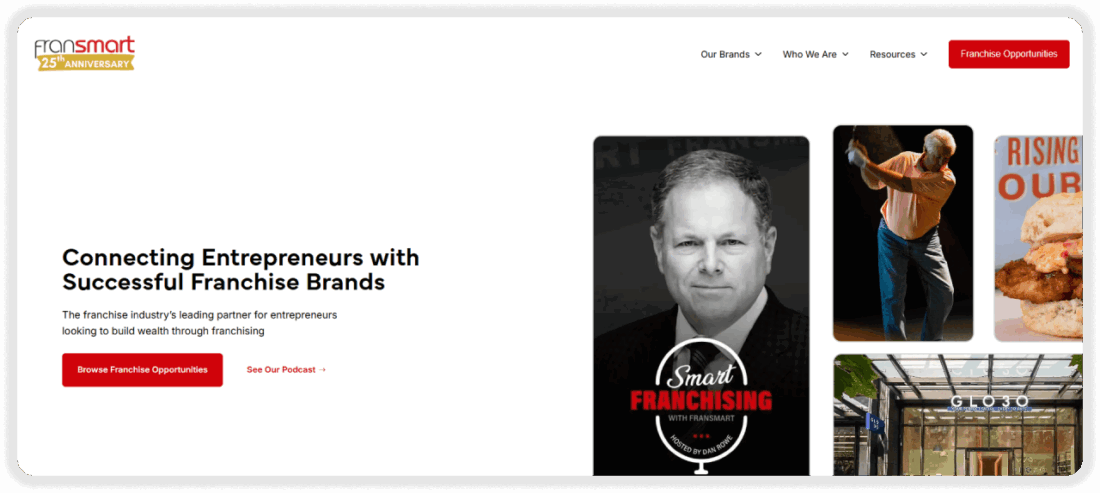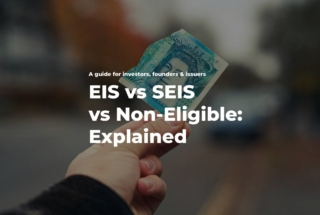Franchise Investing: The Next Frontier for Private Market Platforms?
No time to read? Let AI give you a quick summary of this article.
Franchising has long offered a practical business path for entrepreneurs. From fast-food outlets to fitness centers and home service brands, this model has grown by offering local businesses to launch under established names.
Investment in franchise businesses was mostly limited to franchise owners, private equity firms and institutional investors. However, with fractional franchise investing the rules of the game are changing.
The new model enables individuals to invest in franchise operations through private market platforms and benefit from their cashflows and growth potential.
This article explains how fractional franchise investing works, outlines its advantages, disadvantages and explores use cases.
What you will learn in this post:
What is franchise investing?

Source: Business Daily Media1
Franchise investing means putting money into a proven business model that already works.
In a franchise system, a company (the franchisor) lets independent business owners (franchisees) use its brand name and business setup. In return, franchisees usually pay a starting fee and ongoing royalties.
This setup helps both sides.
The franchisor can grow faster without owning every location, and franchisees get to run their own business with an established brand behind them.
That’s why well-known companies in food, fitness, and home services often expand through franchising: it combines the security of a tested idea with the benefits of local ownership.
How franchise investing works
Franchise systems operate on what’s known as a capital-light model. It means that the franchisor doesn’t need to invest heavily in opening or maintaining each location. Instead, franchisees cover most of the upfront costs, such as securing the site, building out the premises, purchasing equipment and hiring staff.
Because the franchisee provides the capital, the franchisor can expand its network rapidly without tying up significant funds in physical assets. This structure allows the franchisor to focus on areas like brand development, marketing, training, and operational support while earning revenue through franchise fees and ongoing royalties.
For example, McDonald’s and Subway have both built vast global networks using this approach. McDonald’s owns much of the real estate but leaves the day-to-day restaurant investment and operations to franchisees, while Subway has grown primarily by licensing its brand and business model with minimal capital commitment from headquarters.
Franchisors typically receive royalty or management fees as a percentage of system-wide revenue or profit. These fees are tied to ongoing operations across many units; this is why they fluctuate less and are less risky than running an independent business.
Because of these advantages, private equity firms have long viewed franchises as attractive investment targets.

Source: Wefranch2
For example, Roark Capital Group, one of the most prominent investors in this space, has built a diverse portfolio that includes well-known brands such as Dunkin’, Buffalo Wild Wings, Jamba Juice and others. The firm’s focus on consumer and franchise-based businesses has made it one of the leading players in the restaurant and services sectors.
Similarly, Sentinel Capital Partners has invested in several franchise systems, including TGI Fridays, Massage Heights, and Planet Fitness. These examples show that even large institutional investors view franchises as reliable long-term assets.
A brief history of franchise investing
Franchise investing has evolved alongside the modern franchise model itself. Its roots in the mid-20th century, when brands began expanding through standardized business systems rather than company-owned stores.
1950s–1970s – The modern franchise model3 emerges. Brands like McDonald’s, KFC, and Holiday Inn expand nationwide through independent franchise owners who invest their own capital.
1980s–1990s – Private equity firms enter the space. They recognize the stable cash flows of franchises and began investing in restaurant and service chains.
2000s–2020s – Specialized firms such as Roark Capital Group4 and Sentinel Capital Partners5 build diverse franchise portfolios, establishing franchise investing as a distinct asset class. Institutional and family office investors increase participation, viewing franchises as stable, inflation-resistant assets with scalable operations.
2020s-2025s – The rise6 of digital private market platforms introduces fractional franchise investing and opens the market to individual investors.
Introducing fractional franchise ownership
Fractional franchise investing allows individuals to invest in franchise operations through private market platforms.
Previously, franchise ownership required direct operation or significant private capital. Now, through fractionalization, ownership of franchise units can be divided among multiple investors. This allows people to participate with smaller investment amounts.
Why franchise investing is relevant to the private markets
Investors are increasingly looking beyond public stocks and bonds. They want assets that offer diversified income streams, inflation protection, and lower correlation with public markets. Franchises fit this profile well, as they generate steady cash flows from real-world businesses, such as restaurants, gyms, or auto services.
However, direct franchise ownership has traditionally been out of reach. Operating a single franchise often requires $250,000 – $1+ million7 in capital, along with business experience and time commitment. A fractional investment model changes that dynamic by lowering entry barriers. It lets individuals invest as little as $500 – $1,000 in a professionally managed portfolio of franchise units.
This approach unlocks a large pool of retail and accredited investors who want exposure to private markets without operational burdens.
Franchisors typically earn revenue through royalty fees8 and marketing contributions, creating a stable income base without investing much capital.
For investors, this translates into reliable income potential and limited downside risk compared to startups or early-stage private companies.
When one area or sector faces a slowdown, others may remain stable or even grow, and deliver steady overall returns. For example, a franchise portfolio that includes fast-food outlets in urban centers, home repair services in suburban areas, and fitness studios in high-income neighborhoods is less vulnerable to a single market shift.
Private equity firms have been buying and consolidating franchise systems for decades. Their long-term performance shows that franchises can deliver steady cash flows and scale efficiently.
Fractional franchise platforms replicate this private equity playbook, but at a smaller ticket size.
By fractionalizing ownership through digital securities or fund structures, they let retail investors access the same types of deals that institutional players have profited from for years, but without the complexity or size requirements of traditional funds.
How retail investors can access franchise investing
Traditionally, investing in franchises required either owning a franchise directly or having access to large amounts of private capital, often in the hundreds of thousands or millions of dollars. This made franchise ownership largely inaccessible to everyday investors.
With the rise of private market investment platforms, that barrier is now breaking down. These platforms allow fractional franchise investing, meaning investors can buy a small stake in a professionally managed portfolio of franchise units. Entry amounts can be as low as $500 – $1,000, giving individuals access to real-world businesses such as restaurants, gyms, and home services without needing to run the operations themselves.
Fractional franchise investing platforms replicate the same strategies used by private equity firms, such as acquiring, managing and scaling franchise portfolios, but in a format suitable for retail investors. Platforms handle all operational, compliance and reporting tasks, while investors receive a share of profits and potential appreciation.
Additionally, some platforms integrate with retirement and tax-advantaged accounts like IRAs and 401(k)s, allowing investors to participate in franchise ownership with long-term, stable capital.
Franchise investing platforms
Franchise investing platforms fractionalize ownership9, and with it, they make it possible to invest smaller amounts in professionally managed portfolios of franchise units. Here are some examples of such platforms.
FranShares

A leading example is FranShares10, a Chicago-based platform that offers fractional ownership in diversified franchise portfolios. Investors can participate with minimums as low as $500, gaining access to sectors such as restaurants, fitness, and home services.
FranShares handles the selection, management, and operation of franchise units, while investors receive a share of the profits and potential appreciation. The platform’s partnership with Alto IRA, announced in September 2025, now allows individuals to use retirement accounts to invest in franchises through tax-advantaged vehicles.
Fransmart

Another example is Fransmart11, a long-established franchise development firm that launched an investment platform for accredited investors.
Through Fransmart’s model, individuals can co-invest in emerging franchise brands at earlier growth stages before they reach national scale. This approach appeals to investors who want higher potential returns tied to brand expansion rather than steady income from mature franchises.
Building a franchise investment platform with LenderKit
If you are thinking about launching a private market platform for fractional franchise investing, consider a white-label investment software by LenderKit.
LenderKit provides a fully customizable platform that supports various investment models, including equity and debt crowdfunding, which provides a good foundation for building a platform with a focus on fractional franchise ownership opportunities. The platform offers tools for investor onboarding, KYC/AML compliance, document management, campaign marketing, payment processing, and fee management.
Additionally, LenderKit supports secondary market functionality, so your audience will always have an exit plan. This allows investors to trade securities, thereby enhancing liquidity, which is important for attracting retail investors to franchise investments.
To discuss details or see how the solutions work, please get in touch with our team.

Article sources:
- In Today’s Business World, Is Investing in a Franchise Still Worth It?
- Top private equity firms investing in the franchising industry.
- A Brief History of Franchising - Franchise Law
- Roark Capital Group Announces Closing of Fund IV at $2.5 Billion Hard Cap
- Sentinel Capital Partners acquires Captain D's - Sentinel Capital Partners
- FranShares - Company Profile
- Costs to Open Fast Food Franchises, From Chick-Fil-a to Taco Bell - Business Insider
- How Are Franchise Royalty Fees Calculated? - FranConnect
- Alto And FranShares Aim To Unlock IRA Access To Franchise Investing | Crowdfund Insider
- FranShares - Passive Franchise Investing
- Fransmart - Connecting Entrepreneurs with Successful Franchise Brands



